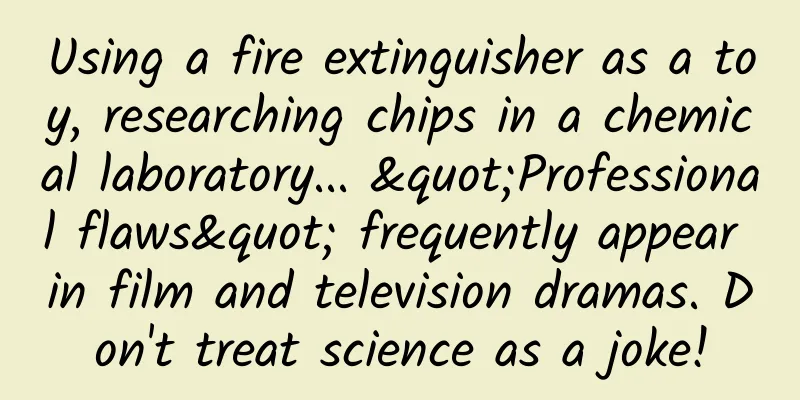Using a fire extinguisher as a toy, researching chips in a chemical laboratory... "Professional flaws" frequently appear in film and television dramas. Don't treat science as a joke!

|
Recently, a popular TV series reflecting the daily life of firefighters was criticized by many viewers for being "unprofessional". It is very common for TV series to be criticized for being "unprofessional". How can we prevent this embarrassment from continuing? Recently, a popular TV series reflecting the daily life of firefighters was criticized by many viewers for being "unprofessional and misleading the public". The reason was a plot in the series where the male protagonist, who was the chief of the fire station, laughed and joked while teaching the female protagonist how to use a fire extinguisher, spraying dry powder everywhere. In response to this, the official Weibo account of "Chaozhou Fire Department" released a video specifically, pointing out that this plot was inappropriate and emphasizing that "fire extinguishers are not toys." @潮州消防 also said that "playing with fire extinguishers is illegal." In addition, playing with fire extinguishers can easily cause safety hazards. Fire extinguishers are tools for putting out fires in the early stages. Once a fire or accident occurs, if the fire extinguisher is lost or ineffective, it may cause more serious consequences. Some netizens criticized that "this plot seriously damages the image of firefighters" and "if children see it, they may follow suit. It's too outrageous!" ▲In the TV series "My Human Fireworks", actors use fire extinguishers as toys (picture from the TV series screenshot) There are many similar situations. Not long ago, there was a web drama that reflected the difficulties of scientific researchers in breaking through key core technologies under the background of my country's chip being "stuck in the neck". It was originally to be broadcast online, but some "unprofessional" plot posters caused controversy during the early promotion. One of the scenes that received more criticism was that the male and female protagonists, as scientific researchers, were working hard in the laboratory, but careful viewers could see at a glance that the setting of this laboratory was extremely "outrageous": the "193 nanometer DUV laser" for photolithography machines was originally developed, but on the tables and shelves in the laboratory, there were beakers, test tubes and other bottles and jars of various colors, just like a chemical laboratory. The male and female protagonists also wore neat and tidy white suits when doing experiments, instead of white hats and white coats commonly used by experimenters. In order to prove the ridiculousness of the laboratory setting in the drama, some netizens specifically found the footage of a real chip research and development laboratory in CCTV news, which was indeed very different from the "laboratory" in the drama. This just proves a sentence in the drama: scientific research is not a joke. In fact, it is common for TV dramas to be criticized for being "unprofessional", especially for some common sense errors, scenes or behaviors that go against common sense. There are very few science fiction films and TV dramas at home and abroad that have not been criticized, but the audience also understands that science fiction is originally imaginative, and even if some plots are not very logical or contrary to our daily experience, it is not a big deal and there is no need to be serious about it. However, non-science fiction films and TV series are different. They may directly "project" some of the cognition onto the audience, and some of the scenes, words, knowledge, and behaviors shown in them may be regarded as real by some viewers. For example, in film and television works, when someone encounters a fire or danger at a height, they jump down with an umbrella or a bed sheet and land safely. But in reality, doing so is extremely dangerous. The umbrellas or bed sheets used in daily life do not function as parachutes at all. Among the TV dramas and movies that have been criticized as "unprofessional" in recent years, medical dramas have the most "slots", such as "mahjong wake-up method", "fetal pulse diagnosis", "unbuttoning white coat as a windbreaker", "wearing sterile gloves to take things" and so on, which are often used as jokes. In a medical drama, the doctor, who is the male protagonist, opened his mouth and asked to inject "100 ml of 9% saline" into the patient, but the normal concentration of saline is only 0.9%. The use of 9% saline may cause hypernatremia in patients, causing electrolyte imbalance and dehydration symptoms. In other plots, doctors often ask patients to "draw 200cc of blood to the laboratory". In fact, generally 2~4ml of blood can basically meet the test volume. Drawing 200ml of blood for testing is not only unnecessary, but also has no medical reason. In other dramas, patients need urgent blood transfusions, but the hospital blood bank is insufficient, so the doctor asks for blood transfusions from close relatives with the same blood type as the patient. In real life, doing so is extremely risky. Some professional doctors have said that blood transfusions are equivalent to transplants, and similar blood relations will produce immune responses. The risk of transfusion-associated graft-versus-host disease (TA-GVHD) after blood transfusions between immediate family members is much greater than that of blood transfusions between non-relatives. This disease can cause low immunity and damage to tissues and organs of the recipient, and in severe cases can even cause death. Blood transfusions between close relatives are rarely used clinically. Film and television works often have an amplifying effect. Many people's cognition, including some professional knowledge and life skills, may be subtly learned from these film and television works. Especially young people, whose world view, outlook on life and values are still in the formation stage, have limited experience, and have little knowledge and skills, often find it difficult to distinguish the difference between film and television narratives and real life. If there are too many or too obvious errors in professional knowledge or skills in film and television works, they are most likely to be misled and form wrong cognitions, which may even affect their lives. To avoid this situation, the filming team needs the main creative personnel, including screenwriters, directors, and important roles, to be down-to-earth, spend time in related industries to experience life in depth, and be familiar with related scenes and daily operations. Even if this does not make them experts, at least they can ensure that they do not make big jokes or say things that are too amateurish during the creation and filming of the work. In fact, even the most criticized medical dramas have received good responses. For example, there was a medical drama that comprehensively reflected the professional life of doctors. Before writing the script, the screenwriter went to the hospital to experience life, put on the white coat of an intern and worked, lived and studied with the doctors for three months. The final work won a lot of applause, and the audience felt that the actors' performances, words, and scenes in the plot were exactly the same as the real thing. In addition, when filming TV dramas, a position such as "scientific consultant" or "technical consultant" can be specially set up, and enthusiastic industry experts can be invited to take up the position and conduct scientific or technical checks on the scene setting, plot setting, actor performance, lines, etc. of the entire work. This position should be fixed, but the personnel can be adjusted according to the industry involved in the film and television work. As we all know, in addition to screenwriters, directors, and actors, film and television shooting also requires cameramen, lighting, art directors, and some action scenes also require martial arts instructors. If "scientific consultants" or "technical consultants" can be included in the formal crew establishment, it will undoubtedly add a layer of protection to the scientificity and rationality of the work, thereby avoiding the emergence of many "slots" in professional knowledge and skills, and reducing misleading the audience. |
<<: The Arctic is turning greener
>>: How are the nine heads of the "Nine-headed Willow" arranged? I know the truth...
Recommend
How much does it cost to attract investment in Yichun Mobile Phone Accessories Mini Program?
The advantages of WeChat mini program investment ...
Interesting: How high can a building be built? Theoretically 20,000 meters, but in reality it is difficult to exceed 1,000 meters
As of 2021, 11 of the world's 20 tallest skys...
Besides painkillers, what other methods can we use to relieve pain?
Produced by: Science Popularization China Author:...
Are you convinced by these 7 reasons why Apple is considering canceling the Mac Pro?
Apple may continue to "discontinue" som...
Random Talk: "Zhejiang" Scientist - Yan Jici: Pursuing the "Light of Science" Throughout His Life
...
Looking back at the ups and downs of domestic mobile phones in the past four years, they still rely on these three tricks to turn things around
Let’s first review the evolution of domestic mobi...
5,000 words of in-depth information to reveal the secrets of offline event promotion!
When it comes to organizing events, it is a love-...
Will deleting works on TikTok limit traffic?
When operating a Douyin account, you certainly ho...
Banners, patches, information streams... Among so many advertising formats, which one is more efficient?
In recent years, programmatic advertising has bec...
How to plan an event promotion plan to achieve sales of 10,000 items?
Recently, the editor saw such a homework question...
Are Taobao's daily specials reliable? It depends on two points!
Taobao’s Daily Specials is a Taobao event that ma...
Detoxification will not only fail to cure the intestines but also cause black intestines, be careful with these things!
Chinese people are keen on "detoxification&q...
12.12 is coming, please check out the wedding photography industry’s advertising secrets!
Following the popularity of 11.11, the 12.12 prom...
How to quickly build a marketing and promotion system for 2B products
In the past two years, the SAAS product market ha...
How to operate and maintain her community with millions of monthly active users in 8 months
This article is the on-site dry goods of WOT2016 ...









